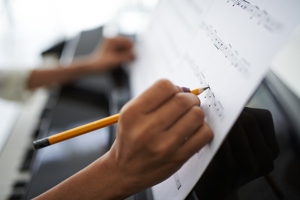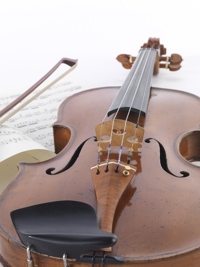
10 tips how to motivate yourself for the daily practice |
How important is motivation, how important is practice?
Practice and motivation make the difference, when it comes to the success of a musician. We already published one article about talent HERE. But the meaning of motivation can hardly be emphasized enough. The psychologist Gary McPherson carried out a study of motivation and practice regarding the learning process of a musical instrument. 157 children, playing a musical instrument were the „test objects“. The children’s performances, playing the musical instruments, were correspondent with the Gaussian (or normal curve) of distribution.
The psychologist Gary McPherson carried out a study of motivation and practice regarding the learning process of a musical instrument. 157 children, playing a musical instrument were the „test objects“. The children’s performances, playing the musical instruments, were correspondent with the Gaussian (or normal curve) of distribution.But they barely depended on the intelligence, the sense of hearing, and the mathematical or movement abilities of the children. Instead the performance was remarkably correlating with the answer of the question, how long the kids are intending to play the instrument. The long-ranging motivated children achieved excessively more, compared to the children who declared to play the instrument for a short period of time in their lives. The children who had given their instrument a long-term meaning in their lives, often reached more than the other children, with even a shorter duration of their practices. With a higher length of practice their achievements were exorbitantly high. Even though the achievements in playing musical instruments are hard to measure, you can see clearly that the achievements depend a lot on motivation.
And now our 10 Tips to motivate your for the daily practice:
1. Mindset
When was the last time you thought about your relation to music in generally and your musical instrument in particular? What do music and your instrument mean to you and your life? Is it a hobby, a passion or a profession? Why did y ou start playing this instrument? Do you remember, what motivated you to start making music, back then?
ou start playing this instrument? Do you remember, what motivated you to start making music, back then?Be honest in answering those questions. The negative feelings and thoughts also belong there. But if you realize, that those feelings overbalance the good feelings, honestly ask yourself the question, if you are still doing the right things with your precious time. Now ask yourself what your long-term goals are, regarding your musical instrument. With this, you have provided a base. To be motivated, first of all you have to know what you want, of course. Visit concerts as often as possible, to visualize, what you want to reach in the long run.
2. Daily exercise
For the daily exercise it is essential to avoid frustration and to keep up the motivation. Don't be hard on yourself, the practice is supposed to be fun! Your life is too short, only to keep yourself busy with duties, that feel like a weight on your shoulders. You are making art, don't forget that.3. Setting priorities
Are you in a phase, where it is absolutely hard for you to pick up your musical instrument, anyway? If you cannot afford to let the instrument rest for a couple of days, or even weeks (because of upcoming concerts or other commitments), then do your practice-unit as soon as possible. Don't hesitate and delay it to the limit. Do it as quick as you can. Always carrying around the upcoming duties you feel like as a burden, will get you into a spiral of frustration, destroying your whole motivation.4. Time management
 A very important factor for frustration often is a conflict with your schedule. The musical instrument deserves to get room in your schedule, equal to the weight or the value it has in your life. Remind yourself, that you are allowed to deal with this theme totally relaxed and that it is inadvisable to place your practice as a fill-in between stressful activities that claim all of your concentration.
A very important factor for frustration often is a conflict with your schedule. The musical instrument deserves to get room in your schedule, equal to the weight or the value it has in your life. Remind yourself, that you are allowed to deal with this theme totally relaxed and that it is inadvisable to place your practice as a fill-in between stressful activities that claim all of your concentration.And don't forget, especially if music is your hobby, to have enough room in your schedule for important things, not only for urgent things.
5. Realistic aims and rewards
A further point for frustration may be having too big goals. When talking about the long-term goals, it is often the best choice to have unrealistic ones. That can absolutely push you. But medium-term or short-term goals are supposed to be within reach. And then, don't forget to reward your successes! In a way, you make yourself a „Pavlovian Dog“, by connecting positive feelings with your practice routine.6. Meditation during the practice
Sometimes it helps to create a new perspective on obnoxious activities. This way, for the future you can consider monotonous finger exercises as a meditation. Then you can relax in(to) your practice, instead of fretting about it. 7. Avoid interruptiones
7. Avoid interruptiones
The concentration must be kept up, during the practice.Hours of do-or-die exercising will probably demotivate you and therefore not raise your proficiency level.
Pauses are a most welcome medium. They support your concentration and give a relaxed frame to the practice.
Surprising interruptions, like a ringing phone, are to be prevented. Many interruptions weaken our proficiency level in the long run and thus our motivation.
8. Things I can / Things I can't
Of course practicing is primarily about learning things you cannot perform yet. But don't forget about the things you've already mastered. Value your previous pay-offs and once in a while, focus on your skills in stock. Your successes are the best motivators!A positive view can take huge effects. Don't forget, that you will never be done with practicing. So when you think about the things you are not capable of yet, be happy that these are the things you are about to master in future. A pessimistic perspective will always steal your motivation.
To reconsider what you already can, record you're playing. You surely have the one or the other tool to record. Like we said, success is the best motivator.
9. A beautiful place
Where do you practice? The room you choose for your exercises should be a place that you love. You don't like it? Look for a new one or make it the place you will love. A space of positive energy. It might be a room for you to withdraw, or an inspiring place that you connect to your love of music.Some pictures and atmospheric items that help you remembering the beauty of your art will affect your daily practice in a very positive way.
 10. Shared aims
10. Shared aims
Many people like to do sports together. For some it is the people who motivate each other or the particular charm of a team sport.Stay connected with other musicians, observe each others' progress and motivate each other to do more.
We invite you to share your experiences and tips about this theme in the comments! We are always happy about our reader's shares.
Mail to Mark Walder:
http://www.drumschool-berlin.de/material/Motivation.pdf (German)
http://www.jazzdrummerworld.com/jazzdrummerworld/wenn-plotzlich-die-motivation-fehlt/ (German)
Add comment
| Blog overview |
» To the blog list
| Newsletter |
 Do you don't want to miss any news regarding viola anymore? Our newsletter will keep you informed.
Do you don't want to miss any news regarding viola anymore? Our newsletter will keep you informed.» Subscribe to our Newsletter for free
 Visit us on Facebook. The news articles are also posted.
Visit us on Facebook. The news articles are also posted.» To Facebook